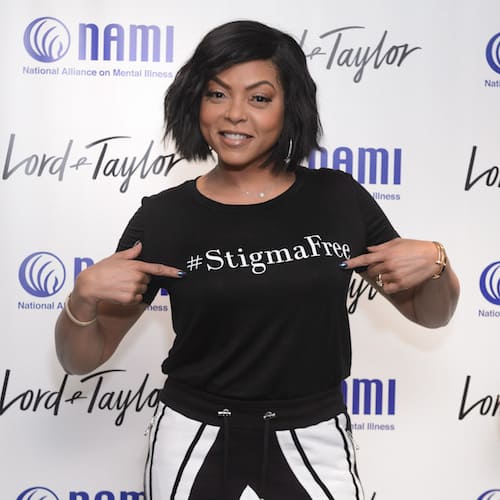July 12, 2019
By Taraji P. Henson
 Thank you, Taraji, for your time and joining us today. We appreciate all the work you are doing in this space. Why is embracing the mental health movement important to you, and why now?
Thank you, Taraji, for your time and joining us today. We appreciate all the work you are doing in this space. Why is embracing the mental health movement important to you, and why now?
Taraji P. Henson: Given the social and political climate we live in today, if not now, when? As a mother and an artist, I’ve always believed that we (adults) have a responsibility to leave the world in a better place than we found it. When I turn on the TV, I’m literally disgusted and sickened by what I see on the news. The fighting, the casual way people sling hurtful language around as if words and morals don’t matter anymore. We are not doing a good job creating a safe space for people to be vulnerable and share their struggles and challenges, from the heart. In fact, people are more isolated than ever, hiding behind social media, going deeper and deeper into depression. We are in a crisis. We have run out of time to wait.
What are the biggest challenges you see in our communities as they address mental health?
TH: I think the biggest challenge is the silence. It’s difficult to help someone if you don’t know they have issues. Most people who suffer from mental illness suffer in silence, especially people of color. They don’t want to be labeled, further demonized, or rendered inadequate for not being seen as whole. James Baldwin once said, “Not everything that is faced can be changed, but nothing can be changed until it’s faced.” I truly believe that.
Why did you form the Boris L. Henson Foundation? What are you hoping to accomplish with it?
TH: My dad was (and still is) my strength. I watched him struggle with mental health challenges, PTSD, having fought in the Vietnam War. I didn’t know then what I was looking at. He managed to show up for me, in the midst of his challenges, and that’s the case for most African Americans. We sometimes just say that it’s our “culture” and shrug it off, when really we’re trying to make it through some really deep issues — racism, poverty, systemic oppression, PTSD — every time we turn the television on, and that affects us all, whether you’re black or white. I formed the foundation to be a voice, to say it’s ok to talk about what you’re going through. Help others find the courage to seek help. Use my platform to break the cycle of silence.
What are some of the proposed activities and events for the Boris L. Henson Foundation?
TH: We are committed to eradicating the stigma around mental health. Through our partnerships with other nonprofit organizations, we will increase mental health support for students in urban school districts, reduce the recidivism rate in the prison system, and ensure cultural competency by offering scholarships to young African American students with an interest in the mental health field. Currently, we are working with the DC Public School System through our Urban Schools Initiative. We’ve partnered with Project 375 to offer Youth Mental Health First Aid Training for teachers, counselors and parents. We are presenting our first annual conference and benefit dinner with therapists, mental health thought leaders and policymakers from around the country. Proceeds will support access to therapy for those who may not have the means to cover expenses. We are on a one-year listening tour, visiting major cities to learn about the state of mental health in communities of color.
How do you see NAMI and the BLH Foundation working together?
TH: NAMI has been a big sister to BLHF since we began this journey. It was the first organization we reached out to in order to gauge where the needs were in the mental health space on policy, culture and, of course, eradicating stigma. We are grateful for all of their support and guidance. We see working together to bring the issue of stigma to the forefront of the national conversation and advocating for those who suffer with mental illness to get the services they need without barriers or incident. Mental health treatment should be a right for ALL.
We have mentioned that there is so much work to be done. How will you know that we are making progress?
TH: We will know it’s working when more schools across the nation in urban neighborhoods have adopted trauma-informed curricula and expanded mental health programs and services beginning in early childhood education. We will know when the suicide rate among black children between the ages of 5-12 has decreased. We will know when more African Americans say, “I’m going to see my therapist on Tuesday,” and it’s as normal as going to the dentist. I believe that day will come. The more we share our own stories, our own challenges, the more space we open for others to share theirs. Break the silence, break the silence. That’s our mission. That’s our call to action. That’s our promise.
Taraji P. Henson is an actress, singer and author. She currently stars as Cookie Lyon on the Fox drama series “Empire,” for which she became the first African American woman to win a Critics’ Choice Television Award for Best Actress in a Drama Series. She also won a Golden Globe Award and was nominated for two Emmy Awards, in 2015 and 2016. Additionally, Henson is a New York Times best-selling author and has been named one of the 100 most influential people in the world by Time magazine. Henson founded the Boris L. Henson Foundation in 2018 as a tribute to her father, who suffered with mental health challenges as a result of his tour of duty in the Vietnam War. For more information, please visit borislhensonfoundation.org.
Note: This interview was originally published in the Spring 2019 issue of Advocate.
We’re always accepting submissions to the NAMI Blog! We feature the latest research, stories of recovery, ways to end stigma and strategies for living well with mental illness. Most importantly: We feature your voices.
Check out our Submission Guidelines for more information.
Submit To The NAMI Blog
We’re always accepting submissions to the NAMI Blog! We feature the latest research, stories of recovery, ways to end stigma and strategies for living well with mental illness. Most importantly: We feature your voices.
LEARN MORE